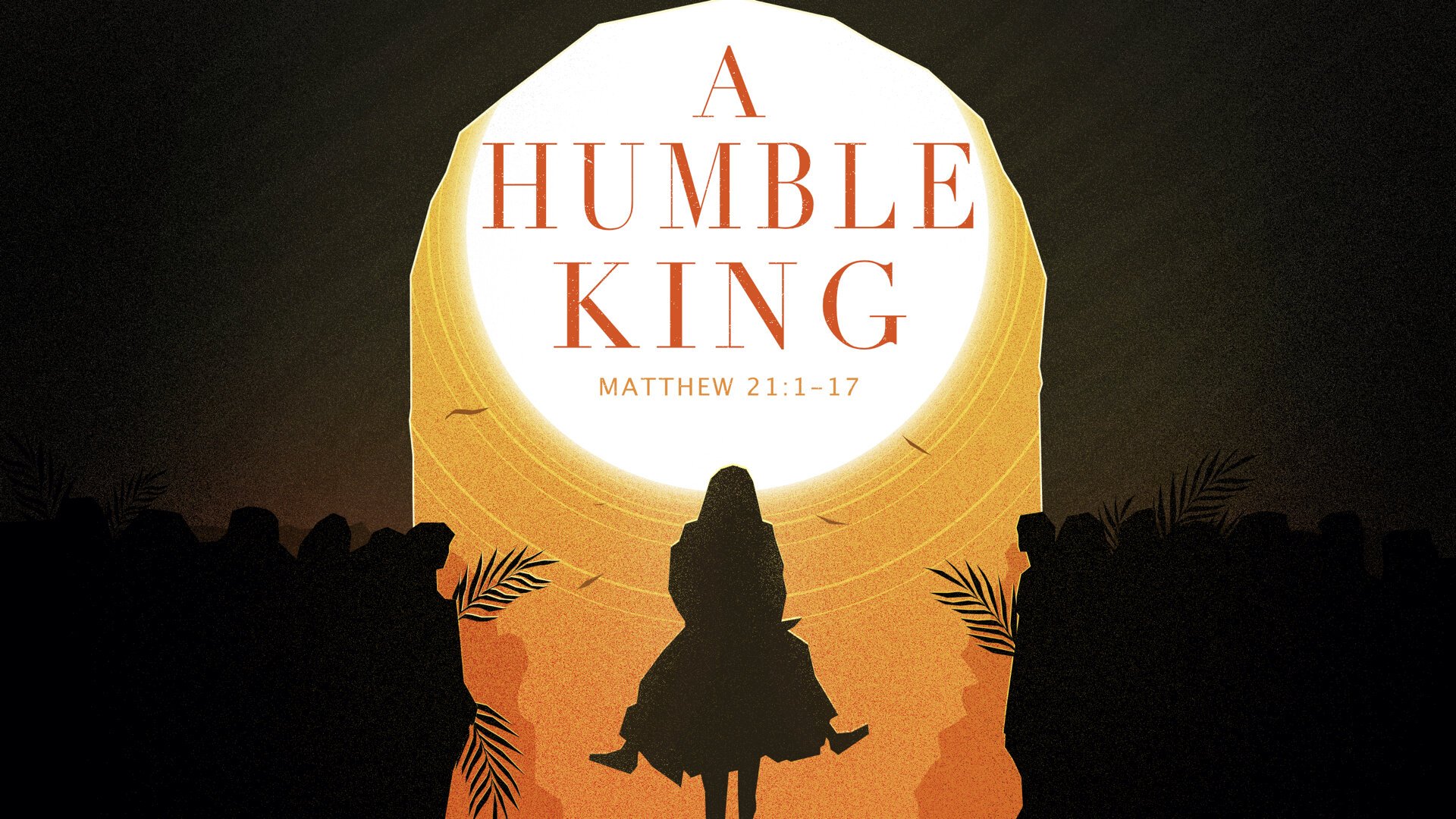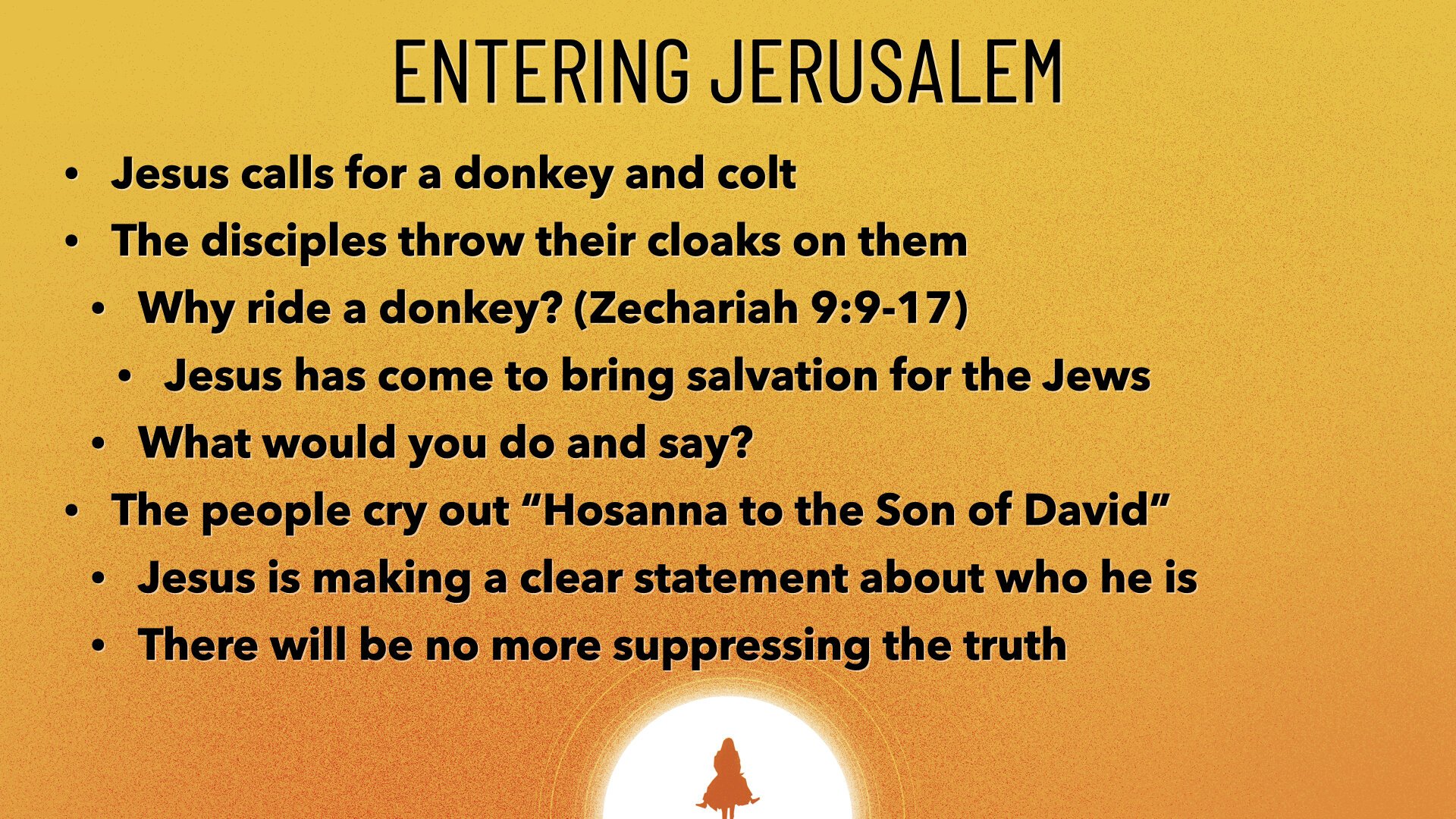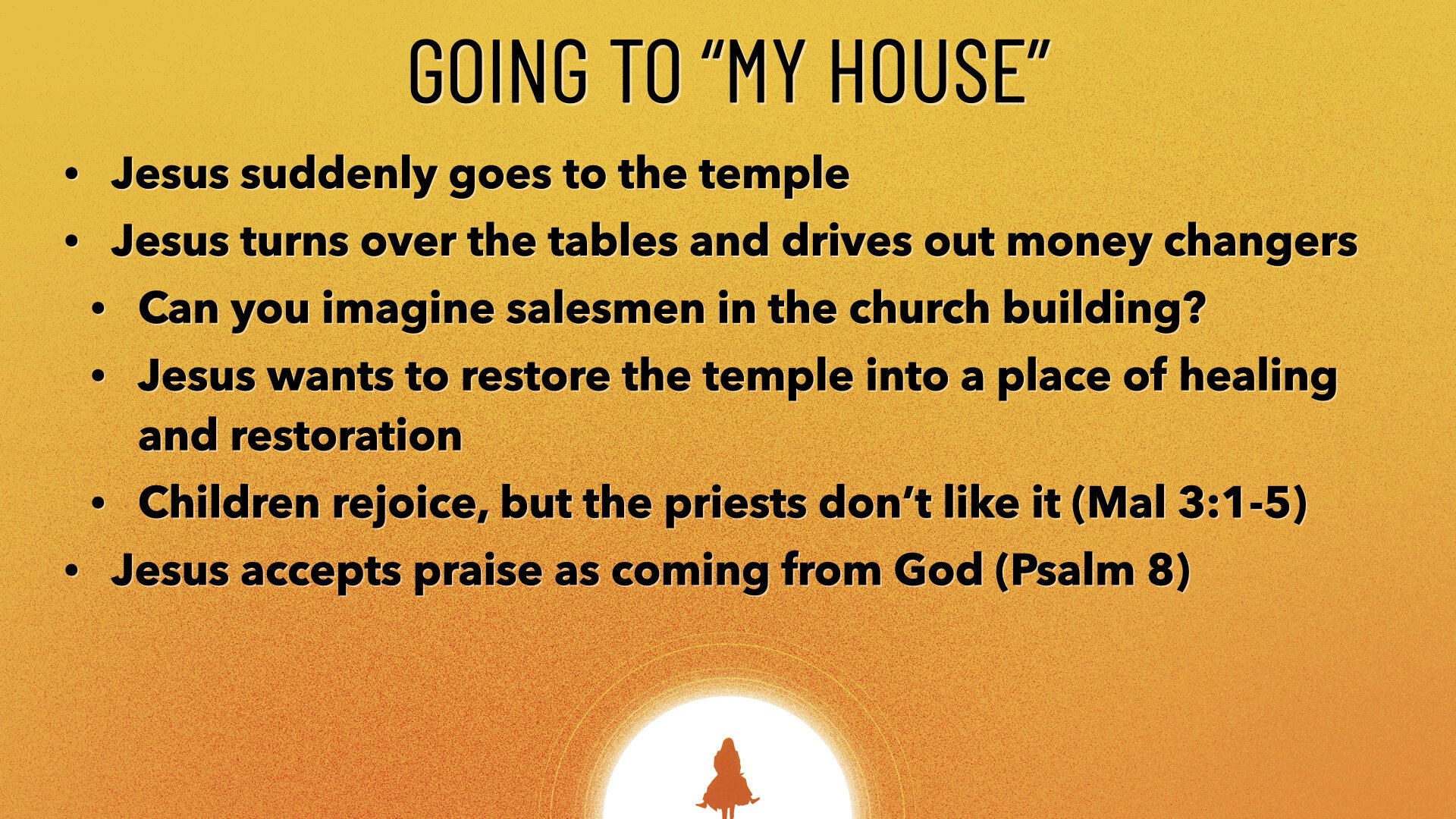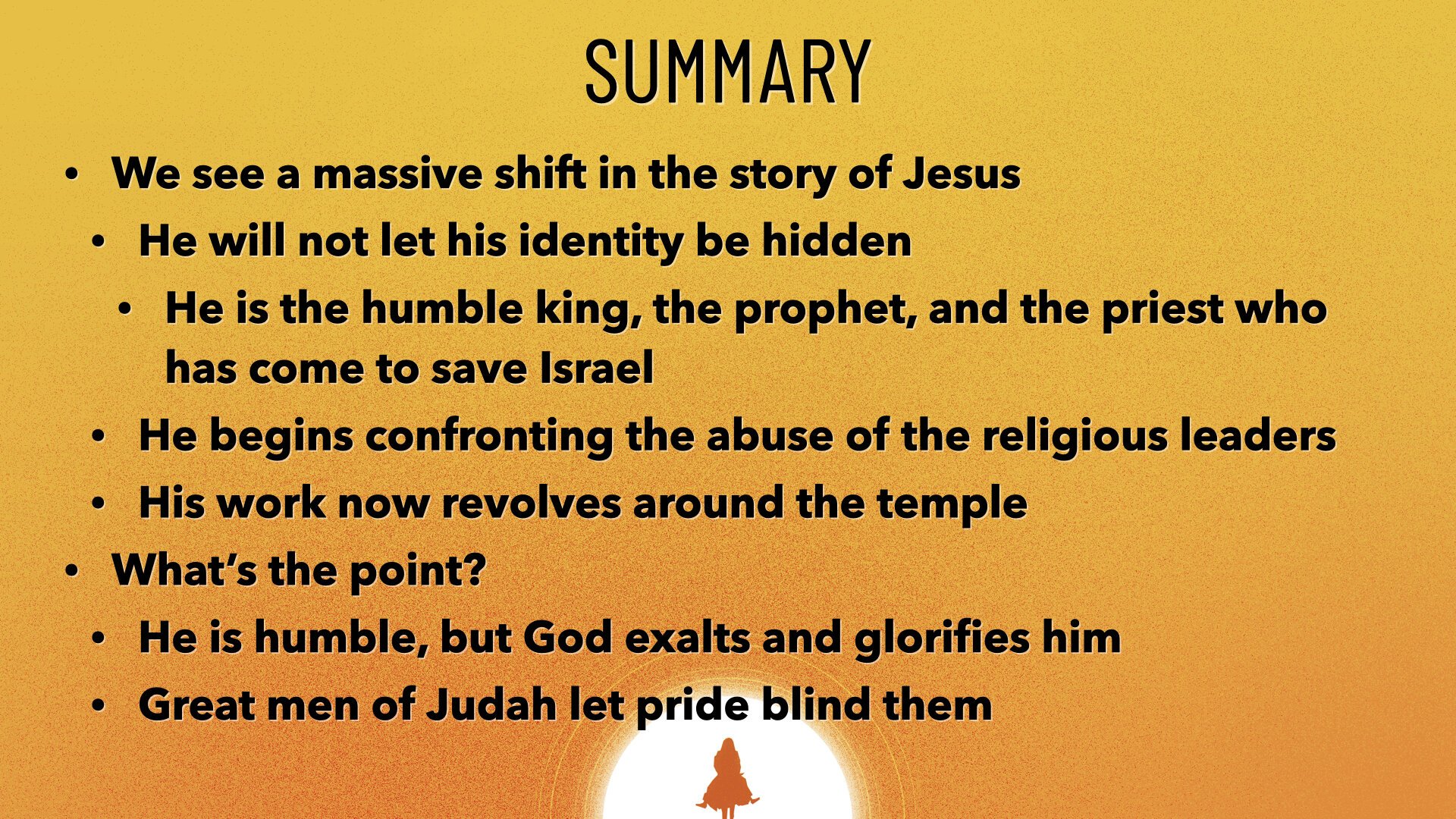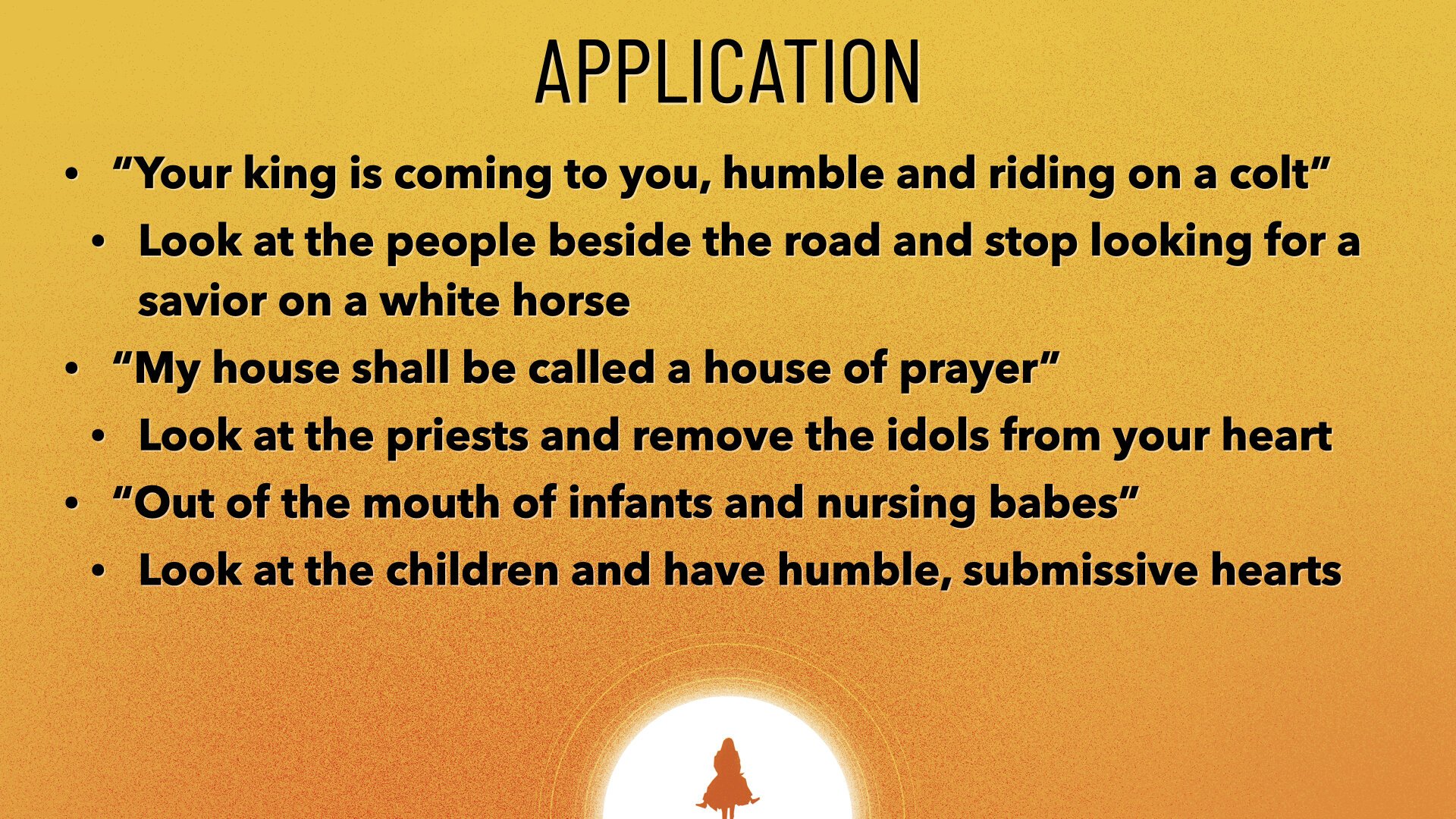A Humble King (Matthew 21:1-17)
Set Up
Out of nowhere, Jesus tells two disciples to go ahead of him and get him a donkey along with its young colt. Now, this doesn't seem like a good idea, and Jesus can see the look on the disciples' faces. He tells them that if anyone asks you, "What are you doing?" You can tell them, "The Lord needs them, and he will send them at once." That sounds like a bad plan, but it works! The disciples go, find the donkey with its colt, and bring them both to Jesus.
Then, the disciples take off their cloaks and place them on the donkey and the colt before Jesus hops on the colt to ride it into town. Now, this might be an odd scene. Why would Jesus be riding on the foal of a donkey instead of the much larger donkey? Why is Jesus riding at all? Why doesn't he walk into Jerusalem on his own two feet? It gets even more bizarre as all the people put their cloaks on the road and palm branches on the road in front of him. Why would they do that? Then, they all cry out, "Hosanna." What is that about? Matthew tells us that Jesus wanted to fulfill what was written about him in Zechariah 9:9-17.
Zechariah 9:9--17 (ESV) --- 9 Rejoice greatly, O daughter of Zion! Shout aloud, O daughter of Jerusalem! Behold, your king is coming to you; righteous and having salvation is he, humble and mounted on a donkey, on a colt, the foal of a donkey. 10 I will cut off the chariot from Ephraim and the war horse from Jerusalem; and the battle bow shall be cut off, and he shall speak peace to the nations; his rule shall be from sea to sea, and from the River to the ends of the earth. 11 As for you also, because of the blood of my covenant with you, I will set your prisoners free from the waterless pit. 12 Return to your stronghold, O prisoners of hope; today I declare that I will restore to you double. 13 For I have bent Judah as my bow; I have made Ephraim its arrow. I will stir up your sons, O Zion, against your sons, O Greece, and wield you like a warrior’s sword. 14 Then the Lord will appear over them, and his arrow will go forth like lightning; the Lord God will sound the trumpet and will march forth in the whirlwinds of the south. 15 The Lord of hosts will protect them, and they shall devour, and tread down the sling stones, and they shall drink and roar as if drunk with wine, and be full like a bowl, drenched like the corners of the altar. 16 On that day the Lord their God will save them, as the flock of his people; for like the jewels of a crown they shall shine on his land. 17 For how great is his goodness, and how great his beauty! Grain shall make the young men flourish, and new wine the young women.
What It's About
The text in Zechariah would have been one of the last prophesies the Jews would have heard. They would be hanging on that prophesy as it promises salvation from Greece and from all the nations that dominate God's people. The king would come, and all the people would become a bow and arrow that dreads down the enemy. God will be with them and make them prosperous.
If you were a Jew near Jerusalem at this time, watching Jesus come into the city of Jerusalem on a donkey would symbolize that he is the king. Up until this point, Jesus has not been letting people lift him up as king. He has consistently refused to accept their praise and resisted their exaltation. But now, Jesus seems to be accepting it as he comes into the city of Jerusalem. Still, the scene is a bit awkward. All the people are throwing their cloaks down before a man riding the colt of a donkey. They are throwing down palm branches before him to signify their respect and to praise him. It's almost like a red carpet, but he is on this little animal. It's almost comical. It's like Jesus is poking fun at all those who are kings on earth.
When the king comes into town, he is typically riding a big strong horse or a chariot. I think about Aladdin, my favorite movie as a child. There is all this pomp and pride as he comes into town being "Prince Ali." This is the way kings of the earth hold themselves up. Their entrance is grand to show how powerful and wealthy they are. But not Jesus. He shows up on this little donkey that is probably following its momma.
As he comes in, people are also shouting, "Hosanna to the Son of David. Blessed is he who comes in the name of the Lord! Hosanna in the highest!" All of this is calling Jesus the king and asking him to save us, as the prophecy says. Hosanna means "save us." They want Jesus to save them from the Roman oppression they are experiencing and believe he has come to do that. He is the "Son of David." David is the greatest king Israel has ever known. No king has ever united and prospered Israel better than David. But there is a promise, which we read about in Chapter 1, that a son of David would be the Messiah King and reign on an eternal throne. They recognize that Jesus is this Messiah. The commotion rises as they get closer and closer to Jerusalem, and eventually, everyone is wondering who this is. Word spreads that Jesus of Nazareth, the prophet, has come into town. Apparently, not everyone has agreed to call him "Son of David."
Going To "My House"
As he comes into town, he doesn't go up to the governor's house or lead some kind of rebellion against the Gentile leaders of the day. He goes straight to the temple and starts turning over tables. He attacked the religious leaders who were utterly destroying the relationship God has with his people for money. He says, "My house shall be called a house of prayer, but you make it a den of robbers." Then, he runs them out of the temple area, and he starts to heal people. Can you imagine if, instead of finding people who want to worship God, you found a bunch of salesmen and people who want to get ahead by charging for convenience? That is so opposite of what is supposed to be happening in the temple. The temple was initially set up by Solomon and dedicated to being a house where the people could turn to God and pray. But did you notice that Jesus refers to scripture and calls it "My house?" Jesus is basically calling himself God and saying that he wants people to view the temple as a place where they can draw near to God for healing and forgiveness. That's why he immediately starts healing people.
This all seems great! We would think that the people can finally understand Jesus' mission and come to the temple with the right purpose now. They should see that Jesus is fulfilling Malachi 3.
Malachi 3:1--5 (ESV) --- 1 “Behold, I send my messenger, and he will prepare the way before me. And the Lord whom you seek will suddenly come to his temple; and the messenger of the covenant in whom you delight, behold, he is coming, says the Lord of hosts. 2 But who can endure the day of his coming, and who can stand when he appears? For he is like a refiner’s fire and like fullers’ soap. 3 He will sit as a refiner and purifier of silver, and he will purify the sons of Levi and refine them like gold and silver, and they will bring offerings in righteousness to the Lord. 4 Then the offering of Judah and Jerusalem will be pleasing to the Lord as in the days of old and as in former years. 5 “Then I will draw near to you for judgment. I will be a swift witness against the sorcerers, against the adulterers, against those who swear falsely, against those who oppress the hired worker in his wages, the widow and the fatherless, against those who thrust aside the sojourner, and do not fear me, says the Lord of hosts.
This text is talking about Jesus coming into the temple and refining the worshippers. The priests should see this and be ready to change their ways. But they watch Jesus turn over tables and heal people, and they hear children cry out, "Hosanna to the Son of David." Then, they get angry or indignant toward Jesus. They call Jesus out and expect him to quiet down that blasphemous talk. It's at this point that Jesus says another quote from the Old Testament. He says, "Have you not read, 'Out of the mouth of infants and nursing babies you have prepared praise?'" Jesus then leaves the city and goes out to Bethany, where Lazarus, Mary, and Martha live. Why quote Psalm 8?
Psalm 8 (ESV) --- To the choirmaster: according to The Gittith. A Psalm of David. 1 O Lord, our Lord, how majestic is your name in all the earth! You have set your glory above the heavens. 2 Out of the mouth of babies and infants, you have established strength because of your foes, to still the enemy and the avenger. 3 When I look at your heavens, the work of your fingers, the moon and the stars, which you have set in place, 4 what is man that you are mindful of him, and the son of man that you care for him? 5 Yet you have made him a little lower than the heavenly beings and crowned him with glory and honor. 6 You have given him dominion over the works of your hands; you have put all things under his feet, 7 all sheep and oxen, and also the beasts of the field, 8 the birds of the heavens, and the fish of the sea, whatever passes along the paths of the seas. 9 O Lord, our Lord, how majestic is your name in all the earth!
This Psalm is praising God for making man in his image and giving him authority. But the phrase, "The babes will cry out in praise," is actually the babies and infants cry out to strengthen him. Jesus is putting himself out there and God is encouraging him through the mouth of babes and infants.
Summary
This whole story is such a massive change from everything we have seen in Matthew. Jesus has been training his disciples on greatness for months leading up to this scene with him entering Jerusalem. He knows that he will be crucified in Jerusalem. He told his disciples this three times. Also, we have always seen Jesus hide who he is. He makes the demons stay silent. He stops the disciples from revealing that he is the Messiah. But now, when he comes in, he is given the grand treatment. The crowds recognize the fulfillment of the prophecies. They call him the Son of David, and he doesn't tell them to stop. Jesus even comes in riding on a colt following Zechariah 9. So the people call for him to save them, and he immediately moves to the temple to face the oppressive religious leaders of their day following Malachi 3. We see that God gave his temple so they could seek salvation, but it has become corrupted with those who are money hungry. Jesus is here to transform the religious society of Judaism once and for all time.
Now Jesus is openly declaring that he is the prophet, priest, king, and Lord of all. Yet somehow, he does it with total humility and reverence. He isn't proud or braggadocios. But he is zealous for the will of God, and God exalts him. All this time, we have been seeing Jesus teaching his disciples about greatness. Now he exemplifies it. He chooses humiliation and humility, but he finds exaltation and glorification.
On the other hand, we see the great men of Judah rejecting him. His criticism has offended those who enjoy the highest seat. They see nothing wrong with what they are doing, but they trivialize worship and mix in idolatry/love of money. God is not glorified or pleased by this fake worship.
Application
As we think about how to apply this text, I want us to focus on the three prophesies that are being fulfilled. First, we must look at the people alongside the road. They look upon Jesus riding a colt, see the fulfillment of God's prophesy, and call out for salvation. Is that us? Do we want a humble king to rule over our lives and tell us how to live? Many people would look at a man like that and scoff.
The priests saw nothing outstanding in Jesus that was worthy of submitting to. They enjoyed living some mixed form of worship and idolatry. It's easy when life is going well to think that we have everything figured out and to be offended when someone tells us, "You got it totally wrong." If someone wants to come into our lives and take over, we will put on the breaks. We would say, "I think I'm doing pretty well for myself. Thank you very much. I know there are some imperfections, but hey I'm way better than the common folk." Do we say this to Jesus? Are we satisfied with our mediocre worship mixed with corruption?
This text tells us that those who are children will submit to the king and cry out, "Save us!" They will say, "Have mercy on me, a sinner!" Jesus is very unassuming. He does not come barging in screaming, "You better submit to me! I'm the king!" He expects us to get the message and make the decision before it's too late. If you are waiting for something to happen in your life to wake you up, let this message be it. Wake up to your need for a king and a savior and let Jesus rule over your life.
Jesus becomes the house of prayer for us. We can turn to God and find forgiveness once we enter his temple. Have you been baptized into Christ? Have you been washed with his blood for the forgiveness of sins? If you don't submit to his rule, there is a terrifying expectation of judgment waiting for you. Please let him bless you with every spiritual blessing before it's too late.
If you are already in Christ, don't let idols into his temple. He wants us to have a heart that desires God first and foremost. We must love our God with all our heart, soul, mind, and strength. If anything has crept in unnoticed, will you remove it today? Set up barriers and obstacles that will prevent you from pursuing anything else above God. He must be everything to be glorified with our life. Put your faith and trust in him. Find your satisfaction in the eternal blessings he provides. Learn about those blessings through an in-depth study of his word. If I can help you with that study, let me know.

